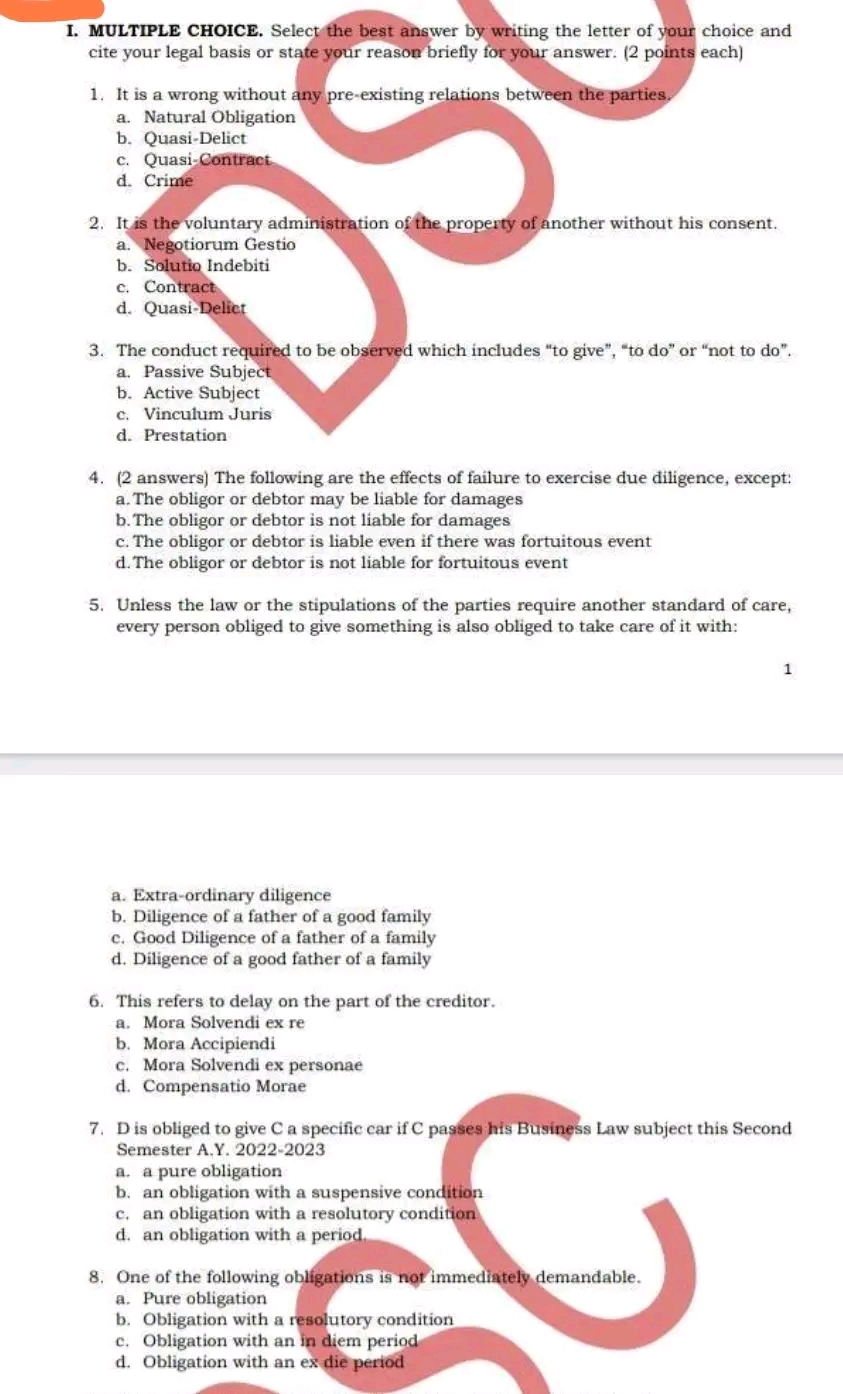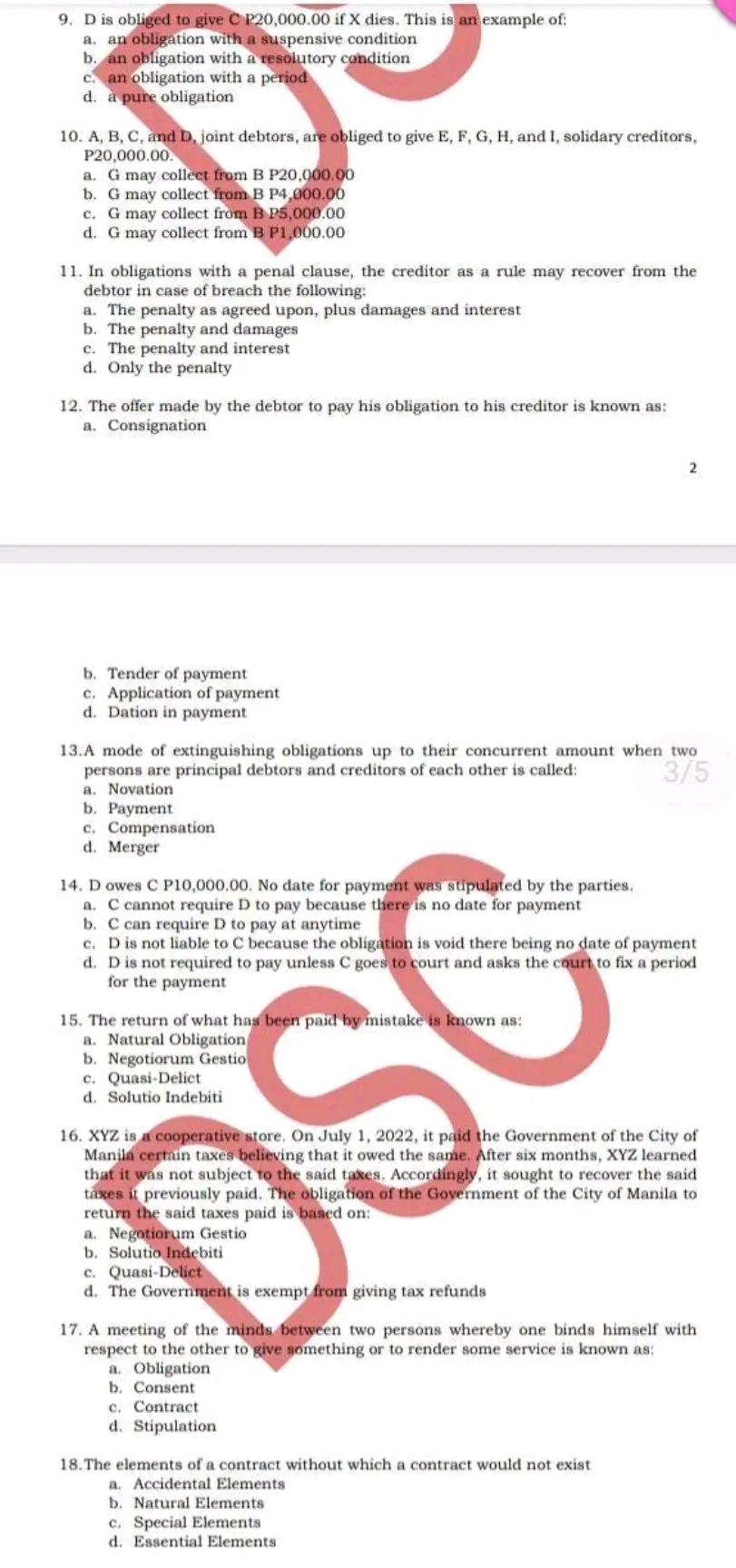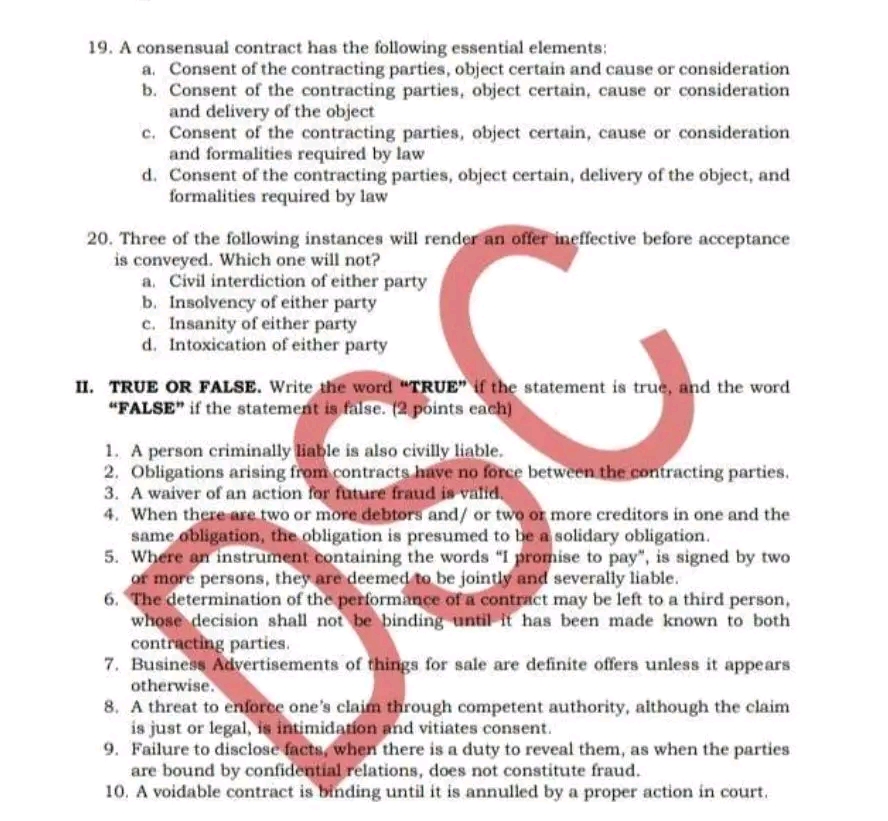Answered step by step
Verified Expert Solution
Question
1 Approved Answer
I. MULTIPLE CHOICE. Select the best answer by writing the letter of your choice and cite your legal basis or state your reason briefly



I. MULTIPLE CHOICE. Select the best answer by writing the letter of your choice and cite your legal basis or state your reason briefly for your answer. (2 points each) 1. It is a wrong without any pre-existing relations between the parties. a. Natural Obligation b. Quasi-Delict c. Quasi-Contract d. Crime DS 2. It is the voluntary administration of the property of another without his consent. a. Negotiorum Gestio b. Solutio Indebiti c. Contract d. Quasi-Delict 3. The conduct required to be observed which includes "to give", "to do" or "not to do". a. Passive Subject b. Active Subject c. Vinculum Juris d. Prestation 4. (2 answers) The following are the effects of failure to exercise due diligence, except: a. The obligor or debtor may be liable for damages b. The obligor or debtor is not liable for damages c. The obligor or debtor is liable even if there was fortuitous event d. The obligor or debtor is not liable for fortuitous event 5. Unless the law or the stipulations of the parties require another standard of care, every person obliged to give something is also obliged to take care of it with: a. Extra-ordinary diligence b. Diligence of a father of a good family c. Good Diligence of a father of a family d. Diligence of a good father of a family 6. This refers to delay on the part of the creditor. a. Mora Solvendi ex re b. Mora Accipiendi c. Mora Solvendi ex personae d. Compensatio Morae 7. D is obliged to give C a specific car if C passes his Business Law subject this Second Semester A.Y. 2022-2023 a. a pure obligation b. an obligation with a suspensive condition c. an obligation with a resolutory condition d. an obligation with a period, 8. One of the following obligations is not immediately demandable. a. Pure obligation b. Obligation with a resolutory condition c. Obligation with an in diem period d. Obligation with an ex die period 1 9. D is obliged to give C P20,000.00 if X dies. This is an example of: a. an obligation with a suspensive condition b. an obligation with a resolutory condition c. an obligation with a period d. a pure obligation 10. A, B, C, and D, joint debtors, are obliged to give E, F, G, H, and I, solidary creditors, P20,000.00. a. G may collect from B P20,000.00 b. G may collect from B P4,000.00 c. G may collect from B P5,000.00 d. G may collect from B P1,000.00 11. In obligations with a penal clause, the creditor as a rule may recover from the debtor in case of breach the following: a. The penalty as agreed upon, plus damages and interest b. The penalty and damages c. The penalty and interest d. Only the penalty 12. The offer made by the debtor to pay his obligation to his creditor is known as: a. Consignation 2 b. Tender of payment c. Application of payment d. Dation in payment 13.A mode of extinguishing obligations up to their concurrent amount when two persons are principal debtors and creditors of each other is called: a. Novation b. Payment c. Compensation d. Merger 14. D owes C P10,000.00. No date for payment was stipulated by the parties. a. C cannot require D to pay because there is no date for payment b. C can require D to pay at anytime 3/5 c. D is not liable to C because the obligation is void there being no date of payment d. D is not required to pay unless C goes to court and asks the court to fix a period for the payment 15. The return of what has been paid by mistake is known as: a. Natural Obligation b. Negotiorum Gestio c. Quasi-Delict DSC d. Solutio Indebiti 16. XYZ is a cooperative store. On July 1, 2022, it paid the Government of the City of Manila certain taxes believing that it owed the same. After six months, XYZ learned that it was not subject to the said taxes. Accordingly, it sought to recover the said taxes it previously paid. The obligation of the Government of the City of Manila to return the said taxes paid is based on: a. Negotiorum Gestio b. Solutio Indebiti c. Quasi-Delict d. The Government is exempt from giving tax refunds 17. A meeting of the minds between two persons whereby one binds himself with respect to the other to give something or to render some service is known as: a. Obligation b. Consent c. Contract d. Stipulation 18. The elements of a contract without which a contract would not exist a. Accidental Elements b. Natural Elements c. Special Elements d. Essential Elements 19. A consensual contract has the following essential elements: a. Consent of the contracting parties, object certain and cause or consideration b. Consent of the contracting parties, object certain, cause or consideration and delivery of the object c. Consent of the contracting parties, object certain, cause or consideration and formalities required by law d. Consent of the contracting parties, object certain, delivery of the object, and formalities required by law 20. Three of the following instances will render an offer ineffective before acceptance is conveyed. Which one will not? a. Civil interdiction of either party b. Insolvency of either party c. Insanity of either party d. Intoxication of either party II. TRUE OR FALSE. Write the word "TRUE" if the statement is true, and the word "FALSE" if the statement is false. (2 points each) 1. A person criminally liable is also civilly liable. 2. Obligations arising from contracts have no force between the contracting parties. 3. A waiver of an action for future fraud is valid. 4. When there are two or more debtors and/ or two or more creditors in one and the same obligation, the obligation is presumed to be a solidary obligation. 5. Where an instrument containing the words "I promise to pay", is signed by two or more persons, they are deemed to be jointly and severally liable. 6. The determination of the performance of a contract may be left to a third person, whose decision shall not be binding until it has been made known to both contracting parties. 7. Business Advertisements of things for sale are definite offers unless it appears otherwise. 8. A threat to enforce one's claim through competent authority, although the claim is just or legal, is intimidation and vitiates consent. 9. Failure to disclose facts, when there is a duty to reveal them, as when the parties are bound by confidential relations, does not constitute fraud. 10. A voidable contract is binding until it is annulled by a proper action in court.
Step by Step Solution
There are 3 Steps involved in it
Step: 1

Get Instant Access to Expert-Tailored Solutions
See step-by-step solutions with expert insights and AI powered tools for academic success
Step: 2

Step: 3

Ace Your Homework with AI
Get the answers you need in no time with our AI-driven, step-by-step assistance
Get Started


